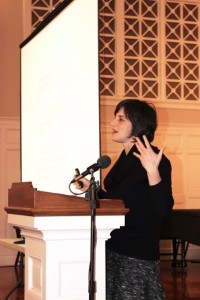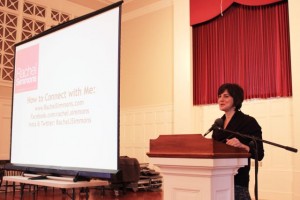
Rachel Simmons opened her talk on Friday morning with a confession: She was a failure. In fact, she had once failed so spectacularly that the president of her college described her as an embarrassment.
What had she done? Ms. Simmons had been accepted to Oxford University as a Rhodes Scholar after college, but had decided to quit the program midway through.
“Up until that point, whatever I wanted to do, I had this feeling that I could get done,” Ms. Simmons, author of The Curse of the Good Girl and Odd Girl Out, told her audience of Williston Northampton students and faculty.
This was Ms. Simmons second visit to the Williston Northampton School. Ms. Simmons, A nationally regarded speaker on bullying prevention and female empowerment, spoke to Williston girls last spring about how they could identify hurtful behavior and change the patterns that created it.
During the special assembly on December 12, Ms. Simmons admitted that although she hated the Rhodes Scholar program, deciding to quit was a point of such personal shame that she felt “completely shattered.”
“I didn’t know how to fail,” she said. “There was no place in my life for failing.”

That fear, and the stress that came with it, was a feeling that Ms. Simmons knew would be familiar to many in her audience—particularly during a time of year when colleges announce the results of their admission cycles.
“Part of what stress is about is feeling like you can’t fail,” Ms. Simmons said. “How do you deal with this myth that you have to be amazing at everything you do?”
Most people dealt with it was through fear, she said, and by avoiding any situation where they might not succeed in spectacular fashion. But when you trade experience for the appearance of being flawless, she said, then you stop being able to grow.
“We start avoiding situations where we might not be excellent,” said Ms. Simmons. “We stop taking risks. We lose the ability to be our best selves.”
That was why students needed a new model for how to approach their successes and failures. And Ms. Simmons was confessing about her experience as a Rhodes Scholar for a particular reason. She intended to be a new “failure role model.”
“You can’t be what you can’t see,” Ms. Simmons said. “That applies equally to stories about success and failures.”
She challenged students to change their inner monologue: to be mindful, practice self-kindness, and frame each failure in terms of its relationship to the common humanity—you’re never the only one who has experienced failure, she said.
“Bravery is what you know about yourself as much as what you want from the world,” she said. “Maybe the best kind of success you can strive for is believing you’re enough.”

